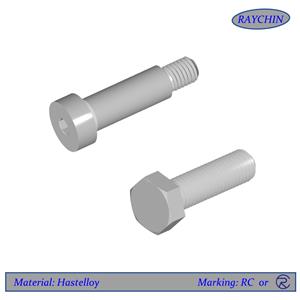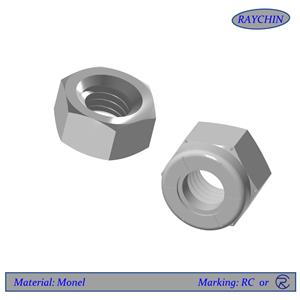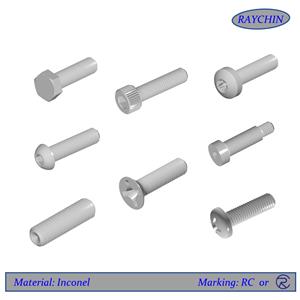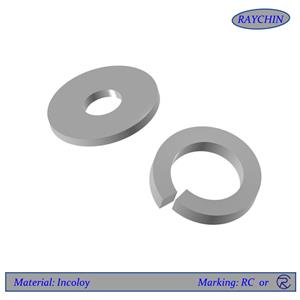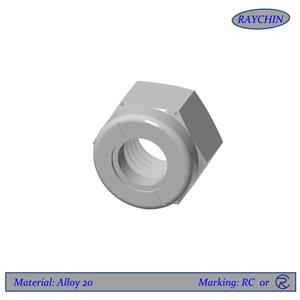-
Inconel Lock Nuts
Inconel® lock nuts, like Inconel 600, 601,625, 686, 718 & 725 nuts, are a family of nickel-chromium-molybdenum alloys used for their high strength at elevated temperatures and good corrosion resistance. Because of its high thermal stability, Inconel can be used in service temperatures ranging from cryogenic to 2200°F (982°C). The high alloy content of Inconel lock nuts enable it to withstand a wide variety of severe corrosive environments. In mild environments, such as the atmosphere, sea water, neutral salts, and alkaline media, there is almost no attack to Inconel nuts. In more severe corrosive environments the combination of nickel and chromium provides resistance to oxidizing chemicals, whereas the high nickel and molybdenum contents supply resistance to nonoxidizing environments.
Send Email Details -
Waspaloy Lock Nuts
Waspaloy lock nuts are known for their superb high strength at elevated temperatures. Waspaloy is a high performance nickel alloy combined with cobalt, chrome and molybdenum to create it’s unique combination of strength and high temperature stability. Similar to that of Inconel 718 nuts, Waspaloy lock nuts exceed the strength and stability of Inconel 718 at elevated temperatures beyond 1400°F. In addition, the oxidation resistance of Waspaloy nuts make it an ideal materials for high temperature applications like gas turbines engines, and a variety of other aerospace components.
Send Email Details -
Zirconium Lock Nuts
Commercially pure zirconium lock nuts, also known as zirconium 702, are most well-known for their superior corrosion resistance in some of the harshest environments that include: • Hydrochloric Acid• Sulfuric Acid• Formic Acid• Nitric Acid • Acetic Acid It is also a metal that offers industry unique properties. It does not absorb neutrons, making it ideal for use in nuclear power and at low temperatures it is superconductive, making it ideal for super magnets.
Send Email Details -
Alloy 20 Lock Nuts
Also known as Carpenter 20 and 20CB-3, Alloy 20 lock nuts offer users a combination of nickel, chromium, molybdenum, and copper which provides good general corrosion resistance. Alloy 20 lock nuts are best suited for mid-range corrosion use – better than steel alloys but not at the level of high performance nickel based alloys like Hastelloy C276. Alloy 20 is a nickel alloy that was specifically designed to withstand the harsh environment of hot sulfuric acid but also performs well in a variety of other acids. Alloy 20 lock nuts are an ideal choice when you don’t need the corrosion resistance power and price-tag of high performance nickel alloys like Hastelloy C276; but you need something that will give you more protection than 316 stainless steel or even a Super Duplex 2507 stainless steel.
Send Email Details -
Titanium Lock Nuts
Titanium fasteners are best known for being strong, lightweight, and corrosion resistant. They are critical to many industries including chlor alkali, marine, off-shore oil & gas, desalination, medical, and pulp and paper. Grade 2 and 5 are the most commonly used grades of titanium screws: • Grade 2 (UNS R50400 / 3.7035) :Commercially pure titanium and the most common grade for screws. • Grade 5 (UNS R56400 / 3.7165): Superior strength-to-weight ratio for a unique combination of corrosion and high strength.
Send Email Details -
A286 Lock Nuts
A286 nuts, also known as Alloy 660 nuts are stainless steel alloy which contains iron, nickel and chromium. A286 lock nuts are known for their high strength, creep resistance and oxidation resistance at elevated temperatures once age hardened. As a result, A286 nuts provide high levels of strength from room temperature up to about 1300°F (700°C). A286 lock nuts are also mildly corrosion resistant. While they should not be used for strong acid environments, they provide excellent oxidation resistance up to 1500°F (815°C) in conditions that would typically be found in high temperature exhaust streams.
Send Email Details -
310 Stainless Steel Lock Nuts
Designed for high temperature applications, 310 stainless steel lock nuts provide high temperature oxidation resistance to 2000°F under mild cyclic conditions. An economic alternative to nickel alloys like alloy 330 or Inconel, 310 lock nuts provide slightly less strength and temperature resistance – but at a significantly lower price point. Alloy 310 can be used in moderately caburizing, moderately oxidizing, nitriding, cementing and thermal cycling applications when not used at the maximum service temperature. 310SS lock nuts also have good resistance to sulfidation and other forms of hot corrosion. Although primarily known for its high temperature properties, 310 stainless steel also provides excellent performance at cryogenic temperatures, with toughness down to -450˚F. Though 310 is ideal for high temperature use, it should not be exposed to the severe thermal shock of repeated liquid quenching or where aqueous corrosive contaminants are present.
Send Email Details -
17-4 PH Lock Nuts
17-4 PH lock nuts are made from a precipitation hardened stainless steel most known for its exceptional strength and its ability to maintain its mechanical properties to 600°F. Compared to 316 stainless steel, 17-4 PH lock nuts yield strength is up over 4 times greater. When compared to Duplex 2205 nuts, the yield strength of 17-4 PH can be up to 2-½ times greater. 17-4 lock nuts are available in 8 different aged (precipitation hardened) conditions offering a variety of mechanical properties
Send Email Details

